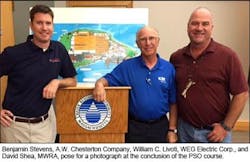Massachusetts Water Resources Authority (MWRA), a Massachusetts public authority established to provide wholesale water and sewer services to 2.5 million people and more than 5,500 large industrial users in 61 metropolitan Boston communities, conducted an in-house Pump System Optimization (PSO) Program in November as a precursor to a pump system assessment of all its facilities.
The Hydraulic Institute (HI) developed the PSO Program for engineers, operations, facilities, maintenance and management personnel to educate their staff in operating pump systems more efficiently and understand how a pump system optimization process identifies problematic areas that represent the greatest MWRA opportunities for energy savings improvement.
“Our goal with this PSO course and the upcoming pump system assessments at all our facilities is to gain valuable new skills to improve our pump system efficiency and reduce MWRA energy and operating costs,” said David Shea, maintenance manager, MWRA, Deer Island Treatment Plant.
The Deer Island Wastewater Treatment Plant, which cost more than $3 billion to erect, is the second largest plant of its kind in the U.S., operating at a maximum flow of more than 1.2 billion gal a day. Additionally, MWRA is currently working with A.W. Chesterton on a new pilot program to coat more pumps and components to improve performance and energy efficiency.
HI provides product-neutral pumps training conducted by subject matter experts, such as William C. Livoti from WEG Electric, who share their years of experience. A.W. Chesterton Co. and WEG Electric Corp. co-hosted this particular pump system optimization training course.
Through the PSO course, MWRA plans to develop specific skills to identify a broad range of system improvement opportunities that will determine where to focus their efforts within their own organization. The company also anticipates developing specific action plans with a clear business justification and a long-term roadmap that outlines a return on their investment in less than two years.
The HI course for both days conveyed the importance of energy conservation to MWRA and how they will drive change and operate pump systems. Through this PSO course, MWRA will better comprehend how optimized pump system are more energy efficient and reliable overall. HI will be working closely with MWRA in 2016 on other technical training programs to further extend their energy savings objectives.
Source: Hydraulic Institute

